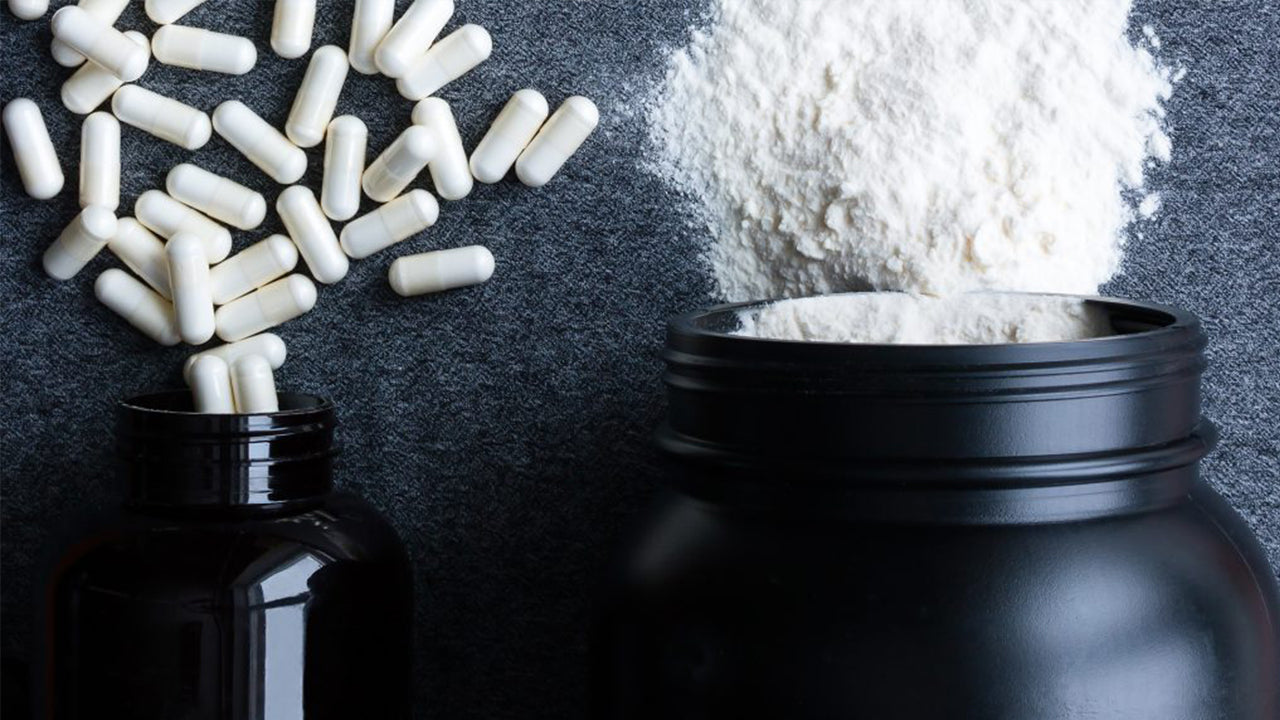Amino Acids vs. Protein Powder: Which Supplement Should You Take?
 By: by Amino Science
By: by Amino Science

If you're interested in how sports nutrition can support your muscle growth goals, you almost certainly know that a diet rich in high-quality protein sources is a prerequisite for anyone working to build muscle. Given that amino acids are the building blocks of protein, it's only logical that they would be just as crucial. While it may seem like amino acids supplements and protein powders serve the same purpose, that's not quite accurate. So, in the amino acids vs. protein powder showdown, which contender triumphs?
Read on to learn more about the pros and cons of both amino acids and protein powder.
The Case for Protein Powder
Any dietitian will tell you that consuming an optimal quantity of high-quality dietary protein is linked to myriad health benefits. Our bodies use protein for building muscle tissue as well as other tissues such as skin, hair, and nails. Some common protein sources include meat, fish, and poultry as well as vegan options like soy protein, legumes, and nuts.
If you're not sure how much protein you should be getting each day, this article can help you calculate an appropriate intake based on both your weight and activity level. Athletes in particular can find it difficult to meet their body's protein needs through diet alone, and protein powders can be a valuable resource for making up the difference.
There are many different varieties of protein powders on the market. In addition to checking the amount of protein per gram, it's important to distinguish between single protein supplements and blended protein supplements. The former contain just one type of protein, for example, grass-fed whey or a plant protein like soy or pea. The latter contain a blend of two or more types of protein, which can lead to a sustained release of amino acids. The quality of the ingredients remains crucial to the efficacy of both types of protein powders (we'll delve into the question of quality assurance more deeply in a later section).
Protein powders made with complete proteins such as whey or casein contain all nine essential amino acids (EAAs) your body requires for sustained muscle growth and recovery, among other bodily functions.
Each type of protein powder has its own unique profile. Whey protein, for instance, digests and absorbs quickly, making it a good pick for a post-workout protein shake. Casein protein, however, absorbs much more slowly, making it ideal for your final dose of protein before bed as the amino acids it contains will release steadily throughout the night, fueling muscle repair as you sleep.
The Case for Amino Acids
Amino acids carry out a range of vital functions in the body. Not only do they propel muscle growth, but they also contribute to the production of hormones, neurotransmitters, co-enzymes, and other important biochemical messengers, as well as encouraging wound healing and strengthening immune responses.
There are 20 amino acids necessary for human health and well-being. Nine are known as essential amino acids (EAAs) because the human body cannot produce them, so it's essential that we supply them via our diet or supplements. As touched on in the previous section, proteins that contain all nine essential amino acids are called complete proteins.
Three of the nine essential amino acids—leucine, isoleucine, and valine—account for 35% of human muscle tissue. These power players, known as the branched-chain amino acids (BCAAs) have a major influence on muscle protein synthesis. Leucine has the most demonstrable impact, but it can only work to its full potential when ingested with the appropriate ratios of the other two BCAAs and the remaining EAAs.
In fact, a significant advantage amino acid powder has over protein powder is that amino acid mixtures can be formulated exactly as desired. Precise mixtures of amino acids can be produced that target specific metabolic issues. Dietary proteins as well as protein powder supplements contain a range of amino acids including both essential amino acids and nonessential amino acids, in varying concentrations. Consequently, they cannot reliably target a specific amino-acid related metabolic response.
It's also important to note that free-form amino acids can be completely absorbed more rapidly than any intact protein, including whey protein. When you ingest a mixture of free-form essential amino acids, the corresponding peak concentrations are higher and are achieved more rapidly.
As with protein powders, it's common to find both single amino acid supplements as well as blended amino acid supplements. Popular picks for single amino acid supplements include leucine and glutamine. Blended supplements may feature a few amino acids with notably desirable effects, like the BCAAs, or the full range of EAAs. You can typically find amino acid supplements in both tablet and powder form.

Amino Acids vs. Protein Powder—The Bottom Line
Protein powders offer an efficient, cost-effective way to increase your total protein intake while providing the caloric fuel your body needs to complete and recover from challenging workouts. They can fuel your muscle-building efforts and fill in any dietary gaps you might have at the same time.
Amino acid supplements, on the other hand, can precisely target various metabolic and physiological processes far more precisely than protein powders can. They can also be absorbed and utilized much more rapidly, meaning you will see more dramatic results faster.
What’s the Best Boost for Muscle Protein Synthesis?
Whey protein is a “fast” protein, which means it is digested and absorbed at a faster rate than other dietary proteins. But free-form amino acids surpass the absorption characteristics of even the fastest protein. The result is that the metabolic response to free amino acid supplements often surpasses the maximal effect that can be achieved with intact protein such as whey, and often with a smaller dose.
The figure below illustrates the advantages of supplementing with free-form essential amino acid mixtures when it comes to spiking muscle protein synthesis. Participants supplemented with three different doses—3.6 grams, 6.7 grams, and 15 grams—of a balanced mixture of all the free-form essential amino acids. Researchers then compared the results to those produced by 15 grams of whey protein and to those of a partial essential amino acid mixture of only branched-chained amino acids (BCAAs). An amino acid powder supplement formulated with all essential amino acids is the clear muscle protein synthesis booster.

We can see how the increase in muscle protein synthesis is more responsive to essential amino acids. The ratios of essential amino acids in amino acid powders can also be optimized. A properly formulated essential amino acid supplement can be 3 times as effective as a whey protein powder supplement. In fact, Amino Co's Athletic Performance EAA supplement is clinically proven to prompt 4 times the peak muscle response of testosterone or HGH.
Combining Amino Acids and Protein Powder for Optimal Results
While essential amino acids are more potent than whey protein, there are advantages to combining aminos with whey as part of a muscle-building amino acid powder supplement, as we did with Heal, our Surgical Recovery blend. Whey protein is digested over a longer time frame than free-form essential amino acids are, and, as far as intact proteins go, has a good balance of essential amino acids (about 45% of the total).
When you consume whey protein with essential amino acids, you prolong the beneficial effects of the aminos. So, while amino acids are the victor in the amino acids vs. protein powder debate, it’s not really an either/or situation. Whey protein and amino acids can work synergistically to produce superior results.
How to Check the Quality of Protein Supplements
The discerning customer knows what he or she wants, but the information provided about a product is often limited to the label on the package. Unfortunately, labels can range from uninformative to downright deceptive.
For example, it is not unusual for as little as 60% of the calories in a “pure whey protein” product to actually come from whey protein, with the balance of calories being comprised of carbohydrate and fat. The lesson is this: Buyer beware! Don’t just buy on the basis of product name. Dig deep into what the product actually provides.
Another labeling issue of considerable concern is how to figure out the relative proportions of different proteins in a protein mixture. Most supplements include some whey protein, as it is widely accepted as one of the highest quality proteins. However, because of cost and certain characteristics, other proteins are often included, such as soy and collagen.
Labeling rarely includes the proportion of each protein. Consequently, the true protein quality of some supplements is uncertain. Ingredients are listed in order of descending quantity, so the first ingredient listed should ideally be a high-quality protein such as whey.
Finally, it is the right of consumers to get what the product promises. Often, this is not the case. Spot-checking of nutritional supplements has revealed that the actual contents do not always match the labeling. There can be ingredients lurking in protein supplement products that aren’t even listed on the label.
For this reason, it is advisable to only buy supplements whose contents have been certified by an independent source, such as US Pharmacopeia. Barring that, at least check the website of the producer to determine if they have the appropriate certifications.
This issue is of particular concern for athletes who could be unwittingly consuming banned substances. Numerous cases of positive tests for banned substances have occurred because an ingredient was included in a supplement but not mentioned in the packaging. Although the industry has been making progress in cleaning up this problem, it still persists. Protein supplements are not regulated by the Food and Drug Administration, so the responsibility falls on the consumer to deal only with reputable suppliers.


Up to 25% off Amino
Shop NowTAGS: supplements
Join the Community
Comments (0)
Most Craveable Recipes




 833-264-6620
833-264-6620



















